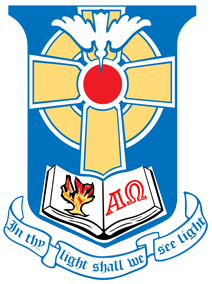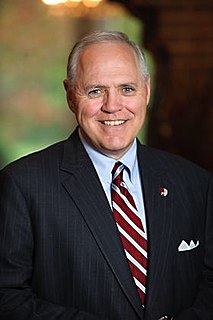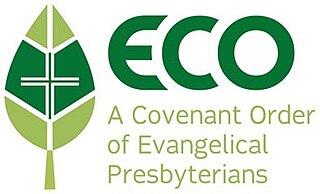Related Research Articles

The Christian Church is a Mainline Protestant Christian denomination in the United States and Canada. The denomination started with the Restoration Movement during the Second Great Awakening, first existing as a loose association of churches working towards Christian unity during the 19th century, then slowly forming quasi-denominational structures through missionary societies, regional associations, and an international convention. In 1968, the Disciples of Christ officially adopted a denominational structure at which time a group of churches left to remain nondenominational.

The Presbyterian Church (USA), abbreviated PC(USA), is a mainline Protestant Christian denomination in the United States. A part of the Reformed tradition, it is the largest Presbyterian denomination in the US, and known for its relatively progressive stance on doctrine. The PC(USA) was established by the 1983 merger of the Presbyterian Church in the United States, whose churches were located in the Southern and border states, with the United Presbyterian Church in the United States of America, whose congregations could be found in every state. The similarly named Presbyterian Church in America is a separate denomination whose congregations can also trace their history to the various schisms and mergers of Presbyterian churches in the United States.

The Presbyterian Church in America (PCA) is the second-largest Presbyterian church body, behind the Presbyterian Church (USA), and the largest conservative Reformed denomination in the United States. The PCA is Reformed in theology, presbyterian in government, and active in missions. It is characterized by a blend of Reformed practice and broad evangelicalism.

Greenville Presbyterian Theological Seminary is a confessional Presbyterian seminary in Taylors, South Carolina, United States. Founded in 1986, Greenville Presbyterian Theological Seminary exists to equip preachers, pastors, and churchmen for Christ's Kingdom. The school is modeled on Old Princeton Theological Seminary of the late 19th and early 20th centuries. It teaches the accuracy and doctrinal integrity of the Westminster Confession of Faith, together with the Larger and Shorter Catechisms, as adopted by the Presbyterian Church in America. It is not affiliated with a specific denomination, but graduates of the Seminary minister in denominations such as the Presbyterian Church in America (PCA), Orthodox Presbyterian Church (OPC). Associate Reformed Presbyterian Church (ARP), United Reformed Churches in North America (URCNA), Reformed Church in the United States (RCUS), Reformed Presbyterian Church, Free Church of Scotland, Evangelical Presbyterian Church in England and Wales (EPCEW), Reformed Presbyterian Church of North America (RPCNA), Iglesia Presbiteriana de Brasil, Association of Reformed Baptist Churches of America (ARBCA), Reformed Baptist Network (RBN), Communion of Reformed Evangelical Churches (CREC), Bible Presbyterian Church (BPC), Presbyterian Reformed Church (PRC), and in a number of Independent congregations. The current president of the seminary is Dr. Joseph A. Pipa, Jr.
The Orthodox Presbyterian Church (OPC) is a confessional Presbyterian denomination located primarily in the northern United States. It was founded by conservative members of the Presbyterian Church in the United States of America (PCUSA) who strongly objected to the Modernist theology during the 1930s. It has had an influence on evangelicalism far beyond its size.

The Associate Reformed Presbyterian Church (ARPC), as it exists today, is the historical descendant of the Synod of the South, a Synod of the Associate Reformed Church. The original Associate Reformed Church resulted from a merger of the Associate Presbytery and most of the Reformed Presbytery in Philadelphia in 1782. The northern Synods eventually merged with the forebearers of the PC(USA). It is one of the oldest of the United States' theologically and socially conservative denominations.

The Presbyterian Church in the United States of America (PCUSA) was the first national Presbyterian denomination in the United States, existing from 1789 to 1958. In that year, the PCUSA merged with the United Presbyterian Church of North America, a denomination with roots in the Seceder and Covenanter traditions of Presbyterianism. The new church was named the United Presbyterian Church in the United States of America. It was a predecessor to the contemporary Presbyterian Church (USA).
Joel Belz is the founder of God's World Publications in 1977, which includes the World Journalism Institute started in 1999 and WORLD magazine, a biweekly Christian newsmagazine, in 1986.

Pittsburgh Theological Seminary is a Presbyterian graduate seminary in Pittsburgh, Pennsylvania. Founded in 1794, it houses one of the largest theological libraries in the tri-state area.

Erskine Theological Seminary is an institution of graduate theological and pastoral education. The Seminary is based in Due West, South Carolina, United States, and also offers classes at a second degree-granting campus in Columbia, South Carolina. Erskine Seminary operates an extension site in [Greenville, South Carolina]]. Erskine Seminary is in the conservative Presbyterian tradition, and primarily prepares candidates for ordained Christian ministry. The Seminary – founded in 1837 – is now the graduate arm of Erskine College, a liberal arts college established in 1839 and affiliated with the Associate Reformed Presbyterian Church. The published mission of Erskine Theological Seminary is: "The mission of Erskine Theological Seminary is to prepare men and women to fulfill the Great Commission of Jesus Christ through theological higher education that is Biblical, ecclesial, and missional ."

Jennings Ligon Duncan III is an American Presbyterian scholar and pastor.

The Fundamentalist–Modernist controversy is a major schism that originated in the 1920s and '30s within the Presbyterian Church in the United States of America. At issue were foundational disputes about the role of Christianity, the authority of Scripture, the death, Resurrection, and atoning sacrifice of Jesus. Two broad factions within Protestantism emerged: Fundamentalists, who insisted upon the timeless validity of each doctrine of Christian Orthodoxy, and Modernists, who advocated a conscious adaptation of religion in response to the new scientific discoveries and the moral pressures of the age. At first, the schism was limited to Reformed Christianity and centered about Princeton Theological Seminary, but soon spread, affecting every denomination of Christianity in the United States. Denominations that were not initially affected, such as the Lutheran Church, eventually were embroiled in the controversy leading to a schism in the Lutheran Church.
Steve Brown is an American Christian author, a radio broadcaster, and a former seminary professor at Reformed Theological Seminary in Orlando, Florida. He describes himself as a Calvinist, and is ordained in the Presbyterian Church in America.
Bryan Chapell is an American pastor and theologian. He is the senior pastor of Grace Presbyterian Church in Peoria, Illinois. Prior to that he was president of Covenant Theological Seminary in St. Louis, Missouri for eighteen years. Chapell is also an author, lecturer, and conference speaker specializing in homiletics. He served as Moderator of the Presbyterian Church in America in 2014.

James Thomas "Jimmy" Draper Jr. was president of the Southern Baptist Convention from 1982 to 1984.
The Manhattan Declaration: A Call of Christian Conscience is a manifesto issued by Eastern Orthodox, Catholic, and Evangelical Christian leaders to affirm support of "the sanctity of life, traditional marriage, and religious liberty". It was drafted on October 20, 2009, and released November 20, 2009, having been signed by more than 150 American religious leaders. On the issue of marriage, the declaration objects not only to same-sex marriage but also to the general erosion of the "marriage culture" with the specter of divorce, greater acceptance of infidelity and the uncoupling of marriage from childbearing.

Geneva Reformed Seminary is a small theological school in Greenville, South Carolina accredited by the Association of Reformed Theological Seminaries and supported by the Free Presbyterian Church of North America. The seminary offers a B.D. and an M.Div. Initially called Whitefield College of the Bible after a companion school in Banbridge, Northern Ireland, the seminary was renamed in 2002 to avoid confusion in the United States where Bible schools and seminaries prepare students at different academic levels.

Michael Anthony Milton is an American Presbyterian minister, theologian, educator, pastor, broadcaster, author, musician and former U.S. Army serviceman. Initially a pastoral intern under D. James Kennedy, Milton became President and Senior Fellow of the D. James Kennedy Institute of Reformed Leadership. Milton succeeded Kennedy as the Teaching Pastor on the nationally televised sermon broadcast Truths That Transform (2013–2015). He has dual credentials in the Presbyterian Church in America and the Associate Reformed Presbyterian Church, and is also credentialed through the Presbyterian and Reformed Commission on Chaplains. Milton was elected to the James Ragsdale Chair of Missions and Evangelism at Erskine Theological Seminary in June 2015. He was named Provost of the Seminary in 2019.

ECO: A Covenant Order of Evangelical Presbyterians is an evangelical Presbyterian denomination in the United States. As a Presbyterian church, ECO adheres to Reformed theology and Presbyterian polity. It was established in 2012 by former congregations and members of the Presbyterian Church (USA), abbreviated PC(USA). Dissatisfaction with the declining membership of the PC(USA) along with growing denominational disputes over theology and bureaucracy led to the founding of ECO. ECO has over 380 congregations and over 500 pastors.
Douglas W. Oldenburg is a pastor and President Emeritus at Columbia Theological Seminary. He served as themoderator of the 210th General Assembly of the Presbyterian Church (USA) in 1998.
References
- 1 2 3 TeSelle, Gene (2004-02-03). "Presbytery action on validation of Parker Williamson's ministry". Witherspoon Society . Archived from the original on 2013-04-16. Retrieved 2020-08-22.
- ↑ "Profile: Parker T. Williamson, executive editor". Archived from the original on 1999-02-09. Retrieved 2020-08-22.
- ↑ Farmer, Michelle (2009-11-20). "Manhattan Declaration & Signers" (Press release). DeMossNews. Archived from the original on 2013-09-01. Retrieved 2020-08-22.